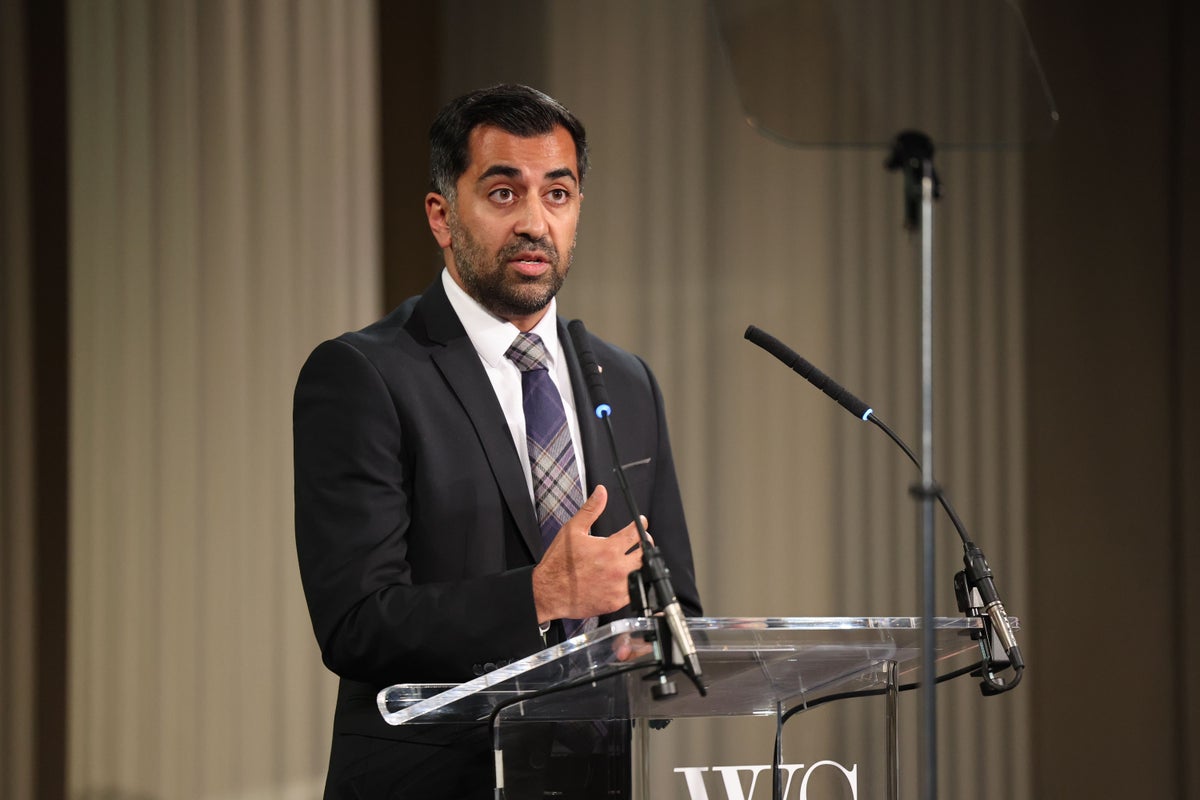
Humza Yousaf has insisted that the SNP is on a “steady footing”, despite figures showing that the party’s deficit grew to more than £800,000 last year.
Accounts published online by the Electoral Commission showed the SNP’s income fell in 2022, while membership numbers were down by more than 8,600 in the first six months of 2023.
The SNP’s total income dropped to £4,248,625 in 2022, down from £4,529,960 in 2021.
With spending last year amounting to £5,052,284, the party recorded a deficit after tax of £804,278 – with this up from at £732,072 in 2021.
In the accounts, the SNP said “neither this deficit, nor the balance sheet are out of keeping with other years in which nationwide elections were fought”, with council elections having taken place across Scotland in 2022.
However, the party added: “It will be important to seek to return the party to surplus in 2023 as we build towards the next general election.”
Mr Yousaf insisted spending in an election year was “hardly a surprise”.
Since he took over as SNP leader in March, Mr Yousaf accepted the party had “pretty difficult” months, but insisted he had “steadied the ship”.
- As of June 29, 2023: 73,936 members
- As of December 31, 2022: 82,598 members
- As of December 31, 2021: 103,884 members
He added: “The party’s finances, I am pleased to say, are on a stable footing.”
Mr Yousaf continued: “We plan to make sure we build on our financial situation, we are on a steady footing.”
He hailed SNP members as being the “biggest asset the party has” , but the accounts showed a decline in numbers.
There were 73,936 party members as of June 29 this year, the accounts showed.
That is down from 82,598 at the end of December 2022, and compares to the 103,884 members the SNP had at the end of December 2021.
Meanwhile, SNP income from members fell from £2,516,854 in 2021 to £2,286,944 in 2022.
The accounts said “overall membership payments decreased by 9% during 2022” – adding that since March last year, the party had “pre-empted cancellations” by offering its members the option of skipping their payments, taking a payment holiday, or lowering these through “reduced giving”.
Here the accounts noted: “Public concern about the economy and job security has understandably impacted on membership income in 2022, with the soaring costs of living being given as the reason for cancelling or lowering membership payments.”
Donations also fell, with income from these dropping from £695,351 in 2021 to £368,538 in 2022.
The accounts also show a fall in fundraising income, from £437,820 to £384,984.
However, after Covid restrictions were lifted, the party’s conference income increased last year, going from £195,526 in 2021 to £515,951 in 2022.
A loan of £60,000 from the party’s “executive management” was still outstanding in 2022, according to the accounts, with former chief executive Peter Murrell – the husband of Nicola Sturgeon – having loaned money to the party.
ON Wednesday, it was announced that the SNP’s former head of communications, Murray Foote, had been appointed as its new chief executive.
Scottish Conservative chairman Craig Hoy said the accounts “paint a grim picture”.
Mr Hoy added: “The SNP also remains in debt to Peter Murrell to the tune of £60,000, which is doubtless why Humza Yousaf failed to suspend him and his wife Nicola Sturgeon following their arrest as part of the (Police Scotland) Operation Branchform investigation.
“The SNP should do the right thing and pay off what it owes its disgraced ex-chief executive and finally sever ties with him.”
Scottish Labour deputy leader Dame Jackie Baillie said the accounts show “the SNP is a party in utter disarray”.
She added: “The financial chaos now engulfing the SNP goes to show how little the governing party can be trusted with Scotland’s finances.”
An SNP spokesperson said: “2022 was a challenging year for all political parties – with nationwide local authority elections, costs rising, and members understandably cutting back on donations due to a Westminster-made, cost-of-living crisis.
“However, as we move forward, the SNP is determined to balance its accounts in preparation for the Westminster election in 2024.”







